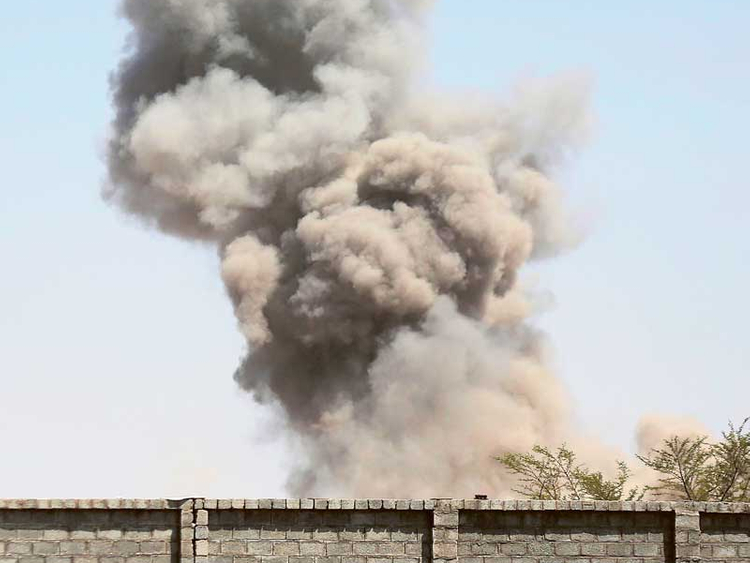|
|
Smoke rises after an air strike hits an army base as tribesmen loyal to Al Houthi rebels chant slogans during a gathering aimed at mobilising more fighters in Sana’a on Sunday. Photo: AP |
Dubai: As international consultations intensify to put an end to the Yemen war, Iran-backed Al Houthi militias formed a government in Sana’a in what analysts said a move to torpedo any possible resumption of talks.
The appointment of Abdul Aziz Saleh Habtour as prime minster of the rebels’ “national salvation” government in Sana’a coincided with the arrival of the UN special envoy to Yemen Esmail Ould Shaikh Ahmad to Riyadh to hold talks with internationally-recognised Yemeni President Abd Rabbo Mansour Hadi.
Commenting on Al Houthi’s move, Aden-based Yemeni analyst Fadel Al Rubeir said, “I believe the move is a pre-emptive to the next round of political negotiations.”
Al Houthis, he continued, “aim to sabotage the next round [of talks] and to say ‘hey we are here on the ground’,” he told Gulf News.
Habtour is the former governor of the southern port city of Aden and one of the members of the political bureau of the ousted Yemeni president Ali Abdullah Saleh’s General People’s Congress.
Appointing Habtour was decided by the “supreme political council” created last July by Al Houthis and their supporters.
“Choosing a figure from the south aims to hit the legitimacy of the internationally-recognised government of Hadi,” commented Mu’ataz Salameh, head of the Gulf Program at Cairo-based Al Ahram Strategic Studies Centre.
“This emphasises the desire of Al Houthis and their supporter Saleh to tighten their grip on power and put some pressure on the coming talks,” Salameh told Gulf News.
Asked how the rebels could tighten their grip on power while they face difficulty in getting international recognition or cooperation, Salameh said “they don’t have a strategic vision or a view of a modern Yemen or a new Yemen ... They deal with the present only.”
Meanwhile, political efforts are under way to revive the deadlocked peace talks.
“Yemen has suffered a lot and Yemenis have to achieve peace as a service to their country and society,” Ould Shaikh Ahmad was quoted as saying after his talks with Hadi.
At the same time, UN Emergency Relief Coordinator Stephen O’Brien started on Sunday a two-day visit to Yemen aims to personally assess the situation in the war-torn country.
On another front, a high-ranking American official was quoted as saying that Washington agrees that it is necessary to reach an immediate cessation of fighting in Yemen in addition to a comprehensive solution.
Such a solution, the official explained, should be sequential in its security and political steps.
“There should be actions to remove the armed forces from Sana’a before a new cabinet is formed to take power in the capital,” the official was quoted as telling the Saudi-owned pan-Arab Al Sharq Al Awsat.
According to UN estimates, the conflict in Yemen has killed more than 6,600 people and displaced nearly three million since March 2015, when the Saudi-led Arab coalition started their military campaign to restore legitimacy in Yemen.
Earlier peace talks to end 18 months of war in Yemen ended in Kuwait last August without any result.













